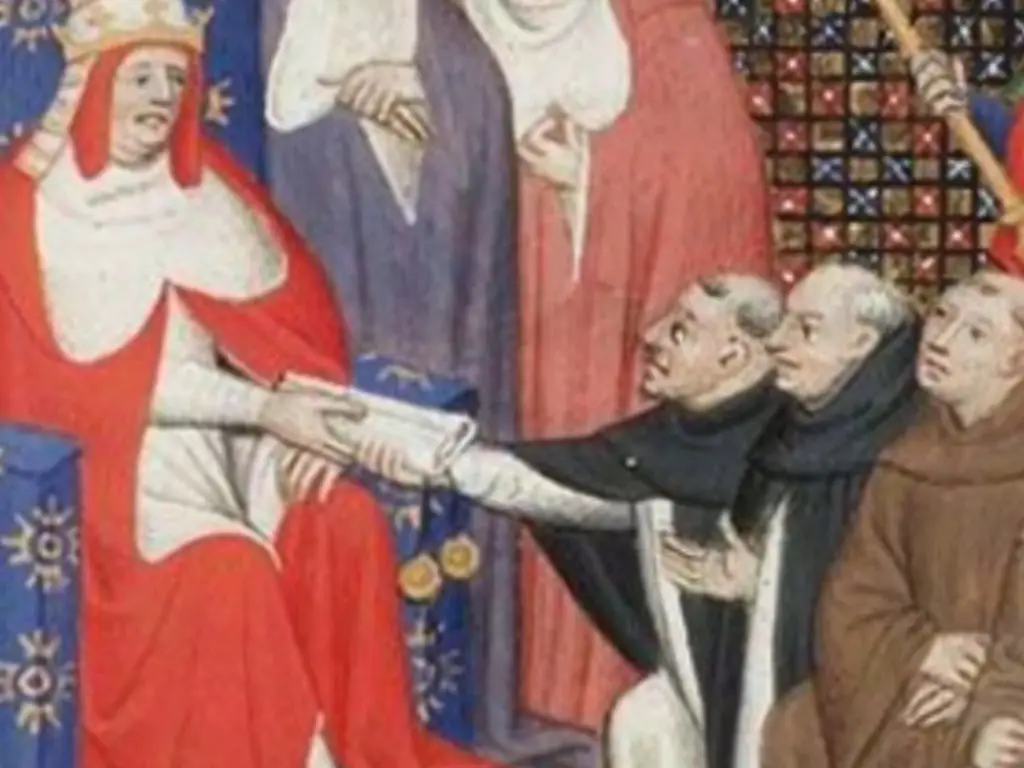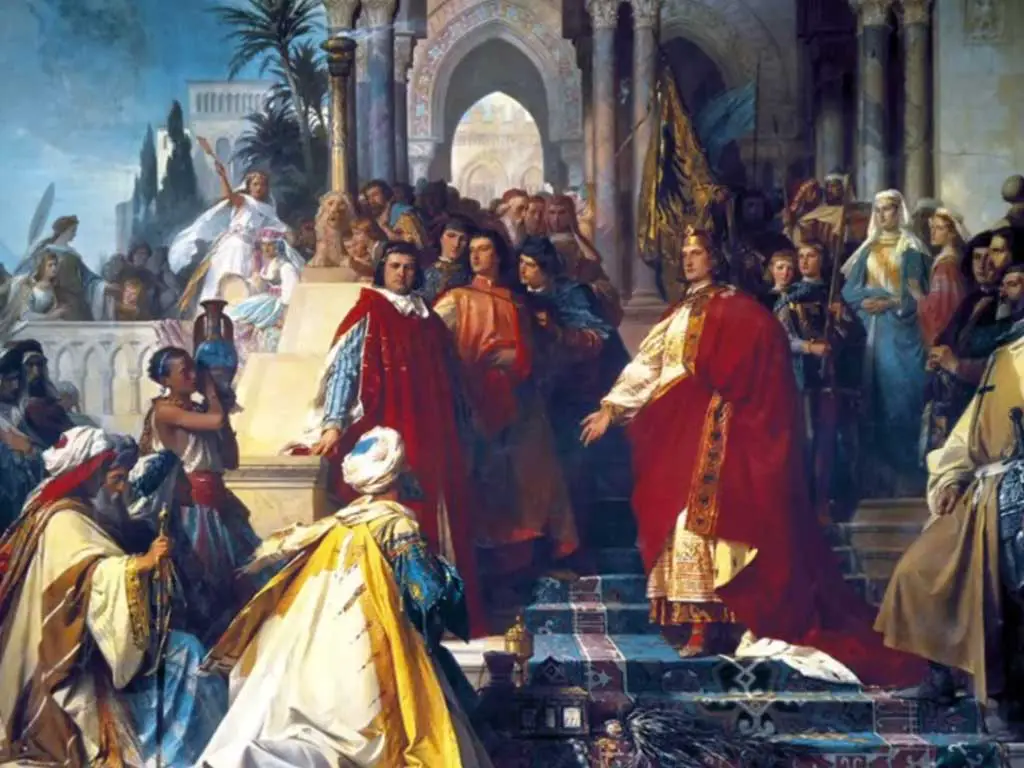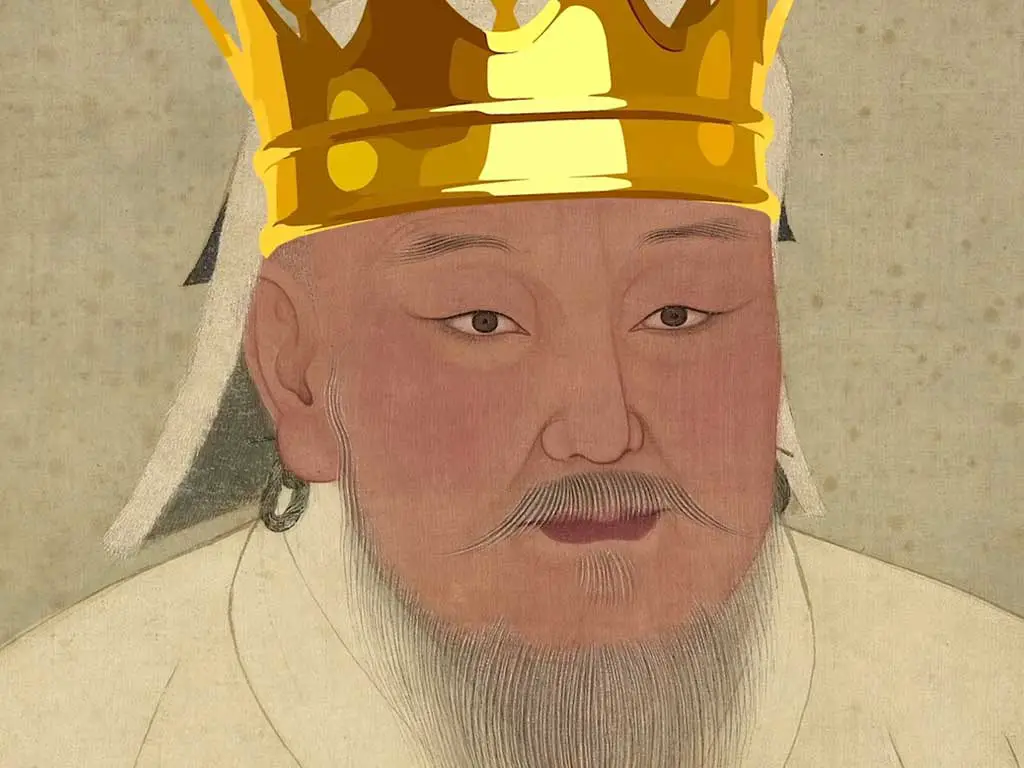Pope Innocent IV’s opposition to the Mongols in the mid-13th century stemmed from their aggressive actions towards Christians and other nations.
In 1245, he penned a letter appealing to the Mongols to cease their attacks on Christians, expressing a desire for peace.
Unbeknownst to him, the Mongol concept of “peace” entailed subjugation. In response, Mongol Khan Güyük demanded the Pope’s submission and homage to Mongol power.
Undeterred, Innocent dispatched emissaries and missionaries to advocate peace and spread Christianity.
Although his immediate efforts did not yield success, they laid the groundwork for Catholic missions among the Mongols, exemplified by subsequent missions led by figures such as André de Longjumeau and Laurent de Portugal in 1245.

Who was Pope Innocent IV?
Pope Innocent IV, born Sinibaldo Fieschi, served as the head of the Catholic Church from 1243 to 1254.
Hailing from Genoa, Italy, he faced the challenging task of leading the Church during a period marked by political turbulence, including conflicts with the Holy Roman Empire and significant interactions with the Mongol Empire.
Pope Innocent IV was known for his diplomatic initiatives and attempts to reconcile differing interests.
His papacy witnessed efforts to establish peace with the Mongols, although these encountered cultural and linguistic challenges.
Pope Innocent IV played a crucial role in shaping the Church’s response to evolving geopolitical dynamics in the 13th century.
Why Was Pope Innocent IV Against the Mongols?
Pope Innocent IV was against the Mongols due to their aggression towards Christians and other nations.
In 1245, he sent a letter to the Mongols appealing to them to stop attacking Christians and inquiring about their future intentions.
Innocent also expressed a desire for peace, possibly unaware that in the Mongol vocabulary, “peace” is a synonym for “subjection.”
The Mongol Khan Güyük replied with a demand for the Pope’s submission and a visit from the rulers of the West in homage to Mongol power.
Innocent also dispatched emissaries and missionaries to call the Mongols to peace and to tell them about Jesus Christ.
While his evangelical outreach wasn’t an immediate success, he helped to open the doors for Catholic missionaries to work amongst the Mongolian people.
Innocent also sent other missions to the Mongols in 1245, including that of André de Longjumeau and the possibly aborted mission of Laurent de Portugal.
What Was Pope Innocent IV’s Life Like During the Mongol Empire?

Pope Innocent IV’s life during the 13th century, amidst the expansive Mongol Empire, was a delicate balancing act between the influential Mongol rulers and the Christian world.
As the head of the Catholic Church from 1243 to 1254, he faced the formidable challenge of navigating diplomatic intricacies while upholding the interests of Christendom amid the Mongol expansion.
Diplomatic Challenges
In 1245, Pope Innocent IV initiated a bold diplomatic move by sending a letter to the Mongols, urging an end to their hostilities against Christians.
This diplomatic endeavor aimed to forge a path to peace in a world marked by geopolitical uncertainties.
The Pope’s efforts reflected a commitment to dialogue and negotiation amid the complex political landscape.
Misunderstandings and Cultural Divide
Despite the Pope’s genuine desire for peace, linguistic and cultural disparities hindered effective communication.
The term “peace” held different connotations for the Mongols, potentially leading to misunderstandings in their diplomatic exchanges.
This cultural gap highlighted the challenges of bridging worlds with distinct perspectives and languages.
Missions and Evangelical Outreach
In response to the Mongol Khan Güyük’s demands for submission, Pope Innocent IV took a multifaceted approach.
Alongside written communication, he dispatched emissaries and missionaries to the heart of the Mongol Empire.
These envoys carried messages of peace and introduced the Mongols to the teachings of Jesus Christ, marking an ambitious evangelical outreach into the heart of Mongol territories.
Challenges and Opportunities
The Pope’s immediate efforts may not have yielded significant results, but they laid the groundwork for future Catholic missions among the Mongols.
The challenges faced by Innocent during this period underscored the complexities of engaging with a powerful and culturally distinct empire.
Yet, they also opened doors for cultural and religious exchange, presenting opportunities for further dialogue between the Catholic Church and the Mongol rulers.
Legacy
Pope Innocent IV’s engagement with the Mongol Empire left a lasting legacy in the history of Catholic-Mongol relations.
His initiatives, despite the challenges and potential misunderstandings, paved the way for future interactions and the presence of Catholic missionaries in Mongol territories.
This period of outreach and diplomacy played a crucial role in shaping the evolving dynamics between the Catholic Church and the formidable Mongol Empire.
How Did Pope Innocent IV’s Life Change Because of the Mongols?

The advent of the Mongol Empire in the 13th century significantly impacted the life of Pope Innocent IV, introducing profound changes in his role as the head of the Catholic Church.
The Mongol influence brought about diplomatic challenges, cultural exchanges, and new opportunities that reshaped the trajectory of Innocent’s papacy.
Diplomacy and Global Dynamics
The Mongols presented a formidable force on the world stage during Innocent IV’s papacy.
Engaging with these powerful rulers necessitated a diplomatic finesse previously untested in the pontiff’s role.
The need for delicate negotiations and attempts at securing peace introduced a new dimension to the papacy, as Innocent navigated the complex geopolitical landscape shaped by Mongol expansion.
Cultural Exchange and Communication
The linguistic and cultural differences between the Catholic Church and the Mongol Empire posed challenges in communication.
Innocent’s interactions with the Mongols required a nuanced understanding of their worldview, introducing a cultural exchange that expanded the pontiff’s global perspective.
The encounters prompted the Pope to grapple with diverse interpretations of concepts such as peace and submission.
Evangelical Outreach and Missions
In response to Mongol demands, Innocent IV took proactive measures, dispatching emissaries and missionaries to Mongol territories.
This marked a significant shift in the papacy’s engagement, as the Church extended its reach into uncharted territories.
The missions, though challenging, laid the groundwork for future Catholic influence and missionary work among the Mongols.
Adaptation to Changing Realities
The Mongol presence forced Pope Innocent IV to adapt to changing geopolitical realities.
The pontiff had to reconcile the traditional spiritual authority of the Church with the pragmatic need for diplomacy in an era marked by the rise of powerful non-Christian entities. This adaptation reflected a dynamic response to the evolving global landscape.
Legacy and Future Interactions
The changes brought about by the Mongol interactions left a lasting legacy on the papacy.
The experiences of Innocent IV paved the way for future popes to engage with non-Christian powers and fostered a more global perspective within the Catholic Church.
The seeds sown during this period of Mongol influence contributed to the evolution of the papacy’s role in a changing and interconnected world.
Pope Innocent IV’s Relationship With Genghis Khan

Pope Innocent IV did not have a direct relationship with Genghis Khan, as Genghis Khan passed away in 1227, several years before Innocent IV ascended to the papacy in 1243.
However, Innocent IV’s interactions were with Genghis Khan’s successors, particularly during the reign of Mongol Khan Güyük.
Indirect Influence of Genghis Khan’s Legacy
While Innocent IV did not engage with Genghis Khan personally, the legacy of the Mongol conqueror cast a long shadow over the geopolitical landscape during the Pope’s tenure.
Genghis Khan’s successors continued the expansion of the Mongol Empire, and it was under their rule that the Catholic Church found itself navigating complex diplomatic relations with the Mongol rulers.
Diplomatic Correspondence
In 1245, Pope Innocent IV initiated diplomatic efforts by sending a letter to the Mongols, appealing for an end to hostilities against Christians.
This correspondence was directed toward the reigning Mongol Khan Güyük, who had succeeded Genghis Khan’s grandson Möngke.
The Pope’s letters were part of a broader attempt to establish peaceful relations between the Catholic Church and the Mongol Empire.
Mongol Khan Güyük’s Response
In response to Innocent IV’s overtures, Khan Güyük replied with a demand for the Pope’s submission and homage to Mongol power.
This response highlighted the challenges of communication and the vast cultural differences between the Catholic Church and the Mongol rulers.
Güyük’s demands reflected the Mongol perception of superiority and the customary tribute-seeking diplomacy.
Emissaries and Missionaries
Undeterred by Güyük’s response, Pope Innocent IV extended his efforts by dispatching emissaries and missionaries to the Mongol territories.
These representatives carried messages of peace and Christian teachings, attempting to bridge the cultural and religious gap between the Catholic Church and the Mongol rulers.
Legacy of Engagement
While Pope Innocent IV’s direct engagement with the Mongols did not lead to immediate success, his efforts marked an early chapter in the relationship between the Catholic Church and the Mongol Empire.
The legacy of these interactions laid the groundwork for future engagements, as subsequent popes continued to navigate the challenges and opportunities presented by the Mongol rulers.
To Recap
Pope Innocent IV’s opposition to the Mongols stemmed from their aggressive actions towards Christians and other nations during the mid-13th century.
The Pope’s earnest appeals for peace conveyed through letters and emissaries, reflected a genuine desire to mitigate hostilities.
However, cultural misunderstandings and the stark disparity in the interpretation of terms like “peace” posed significant challenges.
The Mongol Khan Güyük’s demand for submission highlighted the cultural and ideological gap.
Despite immediate setbacks, Pope Innocent IV’s efforts laid the foundation for future Catholic missions among the Mongols, exemplifying a complex interplay of diplomacy, cultural exchange, and religious outreach in a transformative period of global history.

Leave a Reply